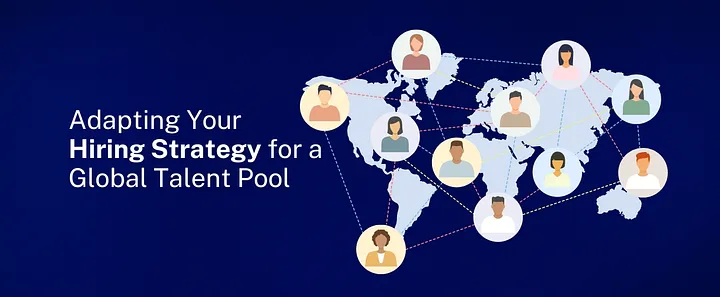In our interconnected world, geographical boundaries no longer limit the search for top talent. The rise of remote work and digital platforms has unlocked a vast global talent pool, offering companies unprecedented opportunities to access diverse skill sets and expertise. However, adapting your hiring strategy to effectively tap into this global talent pool requires careful planning and a human-centered approach. In this article, we will explore the key considerations and strategies for successfully navigating the realm of global recruitment.
Understanding the Benefits of a Global Talent Pool:
Expanding your hiring strategy to encompass a global talent pool brings numerous advantages to your organization:
- Access to Diverse Skill Sets: Casting a wider net allows you to tap into diverse skill sets and experiences that may not be readily available in your local talent market. This fosters innovation, creativity, and the ability to bring fresh perspectives to your organization.
- Overcoming Talent Shortages: Certain specialized roles or niche skill sets can be difficult to fill within a specific geographic area. Accessing a global talent pool increases the chances of finding the perfect candidate for these critical positions.
- Cultural Diversity and Global Perspective: Hiring talent from different parts of the world brings cultural diversity and a global mindset to your organization. This enriches your workplace, promotes cross-cultural collaboration, and enhances your ability to serve a diverse customer base.
- Increased Flexibility: Hiring globally allows for flexible work arrangements, such as remote work or distributed teams. This flexibility can improve work-life balance for employees, boost productivity, and attract top talent seeking a more flexible work environment.
Adapting Your Hiring Strategy:
To successfully adapt your hiring strategy for a global talent pool, consider the following key factors:
- Define Clear Job Requirements: Clearly outline the skills, qualifications, and experience needed for each role. This will help you evaluate candidates objectively, regardless of their geographic location.
- Embrace Remote Work and Flexible Arrangements: Emphasize your organization’s openness to remote work or flexible arrangements. Highlight the tools and infrastructure in place to facilitate effective collaboration and communication across time zones.
- Cultivate a Global Employer Brand: Develop an employer brand that resonates with international candidates. Showcase your company’s commitment to diversity, inclusion, and global opportunities through your website, social media presence, and job postings.
- Adapt Interview and Assessment Processes: Modify your interview and assessment processes to accommodate candidates from different time zones and cultural backgrounds. Offer alternative interview formats, such as video interviews, and provide clear instructions to ensure candidates feel comfortable and prepared.
- Promote Cultural Sensitivity: Foster cultural sensitivity and inclusivity throughout the hiring process. Educate your hiring team about different cultural norms and practices to ensure fair evaluations and respectful interactions with candidates from diverse backgrounds.
- Leverage Technology and Digital Platforms: Utilize technology platforms, such as online job boards, professional networking sites, and global talent marketplaces, to reach a wider audience and connect with potential candidates around the world.
- Partner with Local Experts: Collaborate with local experts or recruitment agencies in target regions to gain insights into local talent markets, cultural nuances, and legal considerations. These partnerships can provide valuable support in navigating global recruitment challenges.
- Offer Competitive Compensation and Benefits: Research and benchmark compensation packages to ensure they align with local market standards and attract top talent. Consider additional benefits such as relocation assistance, visa support, or cultural integration programs to facilitate the onboarding process.
- Prioritize Effective Onboarding: Develop a comprehensive onboarding process that supports seamless integration for new hires, regardless of their location. This includes providing clear communication, offering training and support, and promoting a culture of inclusion and collaboration.
Recruiting from a global talent pool presents a unique set of challenges for companies, but it also offers significant advantages in terms of access to top talent and a more diverse workforce. To successfully navigate this landscape, companies must adapt their recruitment processes. By doing so, they can attract and retain the best possible candidates from around the world and build a competitive advantage in an increasingly interconnected global economy.

Leave a Reply